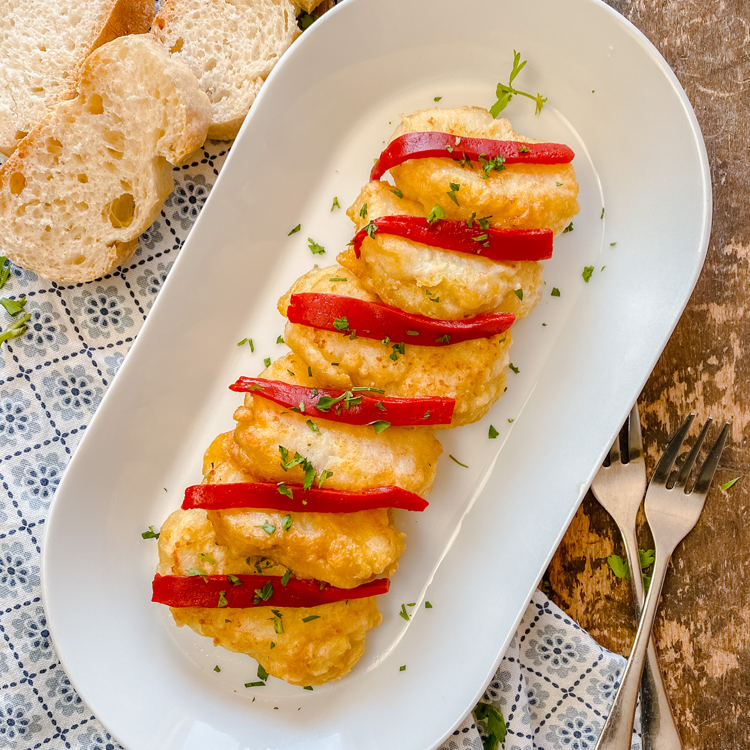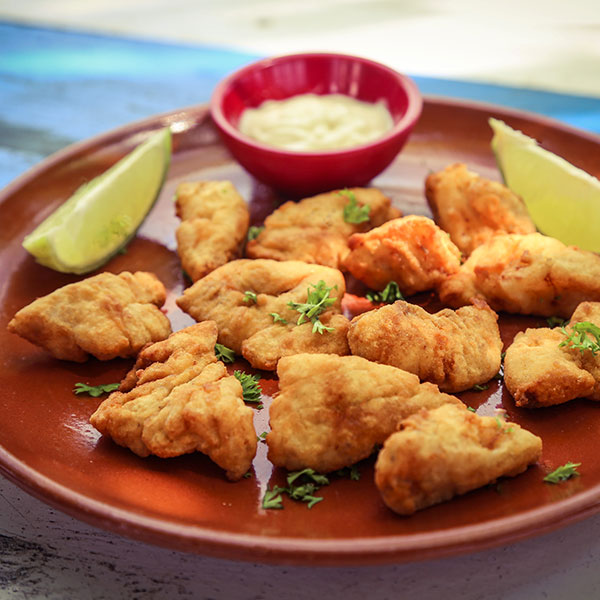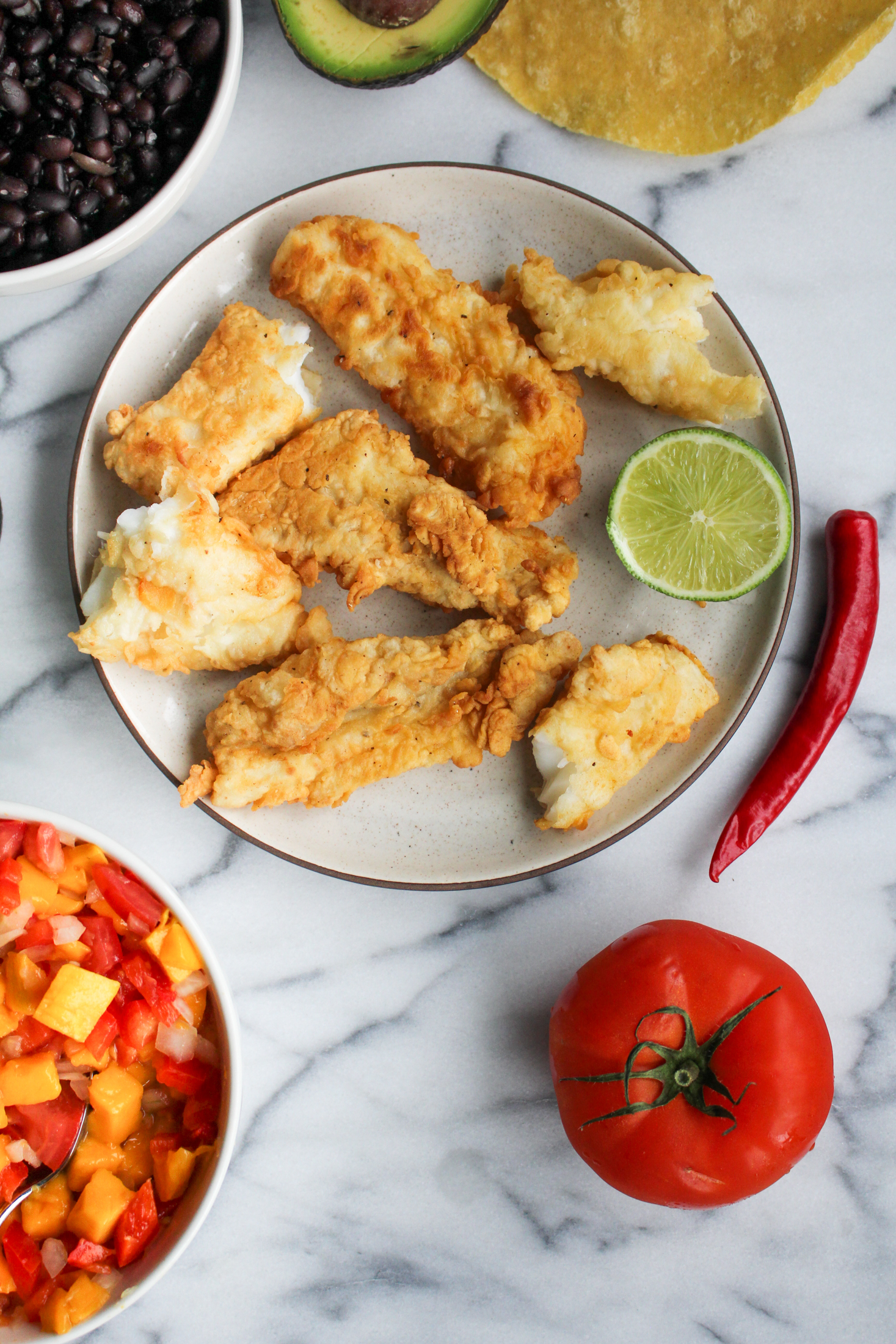During a recent voyage across the sun-drenched coasts of Spain, I found myself utterly captivated by the rich tapestry of local cuisine, a journey that was as much about discovering myself as it was about exploring new lands. Amongst the myriad of dishes that I had the pleasure of tasting, one in particular left an indelible mark on my culinary soul: Fish Tapas. This dish, a harmonious blend of tender mussels, sweet peas, and the delicate richness of egg, encapsulated the vibrancy of the sea and the earth in each bite. Its flavors – a symphony of the ocean’s brine with the subtle, comforting notes provided by the peas and the unifying richness of egg – were a revelation. Driven by an insatiable curiosity and a newfound passion, I embarked on a quest to recreate this culinary masterpiece. After numerous attempts and a journey that took me through the heart of traditional and contemporary culinary techniques, I succeeded. It’s with great excitement and humility that I now wish to share this cherished recipe with you, hoping it will tantalize your taste buds and transport you to those very same Spanish shores that continue to inspire me.
Fish Tapas Recipe


Fish Tapas
Equipment
- 1 frying pan
- 1 large mixing bowl
Ingredients
- 40 g butter
- 500 ml salt
- 110 g peas
- 40 g flour
- 1 carrot
- 1 bay leaf
- 200 g flour
- 12 mussels
- 1 onion
- 100 ml olive oil
- Salt
- 200 g cod
- 3 tablespoons water
- 1 egg
Instructions
- Combine the flour, oil, yolk, liquid, and a bit of salt to make a pastry.
- In boiled water, cook fish and mussels with cabbage, carrot, and lemon zest.
- Strip the mussels from their skins until cooked and cut finely.
- Remove some bones from the fish and chop it up.
- In boiled water, prepare the vegetable peas.
- Create a thick white liquid with the oil in a frying pan.
- Combine the diced fish, mussels, and peas in a large mixing bowl.
- Seal the sides of the pastry by folding it over.
- Keep 10 to 15 minutes in a deep fryer.
- Serve with fried tarragon on the side.
Cooking Tips about Fish Tapas

- Quality of Ingredients: For a dish as nuanced as Fish Tapas, the freshness and quality of your ingredients cannot be overstated. Source the freshest mussels you can find, ideally from a local fishmonger, and opt for organic peas and eggs. The vibrancy and depth of your dish rely heavily on these core components.
- Mastering the Mussels: Cooking mussels to perfection is critical. Clean them thoroughly under cold running water, removing any beards and discarding any mussels that do not close when lightly tapped. Steam them just until they open to preserve their tender texture. Overcooking will make them tough.
- Peas’ Perfect Presentation: Peas should retain their bright green color and slight crunch for a beautiful contrast in texture and a pop of sweetness. Briefly blanching them in boiling water, then plunging into ice water, will achieve this balance perfectly.
- Egg Excellence: Achieving the right consistency with the egg—as either a binding agent or a delicate topping—will enhance the dish significantly. Whether you’re gently folding scrambled eggs into the mixture or crowning your tapas with a soft-boiled egg, ensure it complements the overall texture without overpowering the other ingredients.
- Balancing Flavors: The essence of Fish Tapas lies in the harmony between the briny seafood, the sweetness of peas, and the richness of the egg. Season judiciously with salt, pepper, and perhaps a dash of smoked paprika or a squeeze of lemon to elevate the natural flavors without overshadowing them.
- Presentation: Tapas are as much about presentation as they are about flavor. Serve your Fish Tapas in a manner that entices the eyes: a colorful platter, garnished with fresh herbs, or even individual portions that invite communal dining. Remember, eating starts with the eyes.
- Pairing: Lastly, consider what to serve alongside your Fish Tapas. A crisp white wine, such as an Albariño or a Verdejo, can complement the oceanic flavors beautifully. Additionally, a side of crusty bread will not only round out the meal but also ensures not a single drop of the flavorful juices goes to waste.
Serving suggestions about Fish Tapas

- Use Small Plates or Tapas Dishes: True to the tapas tradition, serve your Fish Tapas on small plates or in tapas dishes. This encourages communal dining and allows guests to try a variety of flavors without commitment to a single large plate.
- Create a Tapas Spread: Complement your Fish Tapas with other Spanish-inspired small plates such as patatas bravas (spicy potatoes), chorizo in red wine, and Spanish olives. Offering a range of dishes will provide a full tapas experience and cater to different palates.
- Incorporate Fresh Bread: Serve alongside slices of crusty, fresh bread. It’s perfect for dipping into the sauce or juices that accompany the Fish Tapas, ensuring that none of the delicious flavors go to waste.
- Pair with Wine: Select a wine that complements the delicate flavors of the mussels, peas, and egg. A crisp, light-bodied white wine like Albariño or Verdejo, as mentioned previously, pairs beautifully, enhancing the dish’s flavors without overwhelming them.
- Garnish Thoughtfully: A sprinkle of fresh herbs, such as parsley or cilantro, not only adds a pop of color but also introduces an additional layer of flavor. A lemon wedge on the side allows guests to add a spritz of acidity if desired, brightening the dish.
- Consider the Setting: To enhance the ambiance, consider adding Spanish music in the background and decorating the table with elements that evoke the Mediterranean coast, such as blue and white linens or sea-themed decor.
- Dessert Pairing: For dessert, keep the Spanish theme going with options like churros served with a rich chocolate sauce or a refreshing fruit salad dressed with mint and a splash of Spanish cava.
Top 5 FAQs about Fish Tapas

- What are Fish Tapas? Fish Tapas are small, savory dishes featuring seafood as the star ingredient, commonly served in bars and restaurants across Spain. They can include a variety of seafood, such as mussels, and are often accompanied by ingredients like peas and egg. Originally designed as a snack to accompany drinks, tapas have evolved into a comprehensive culinary experience, showcasing the rich flavors and traditions of Spanish cuisine.
- How do I prepare the mussels for Fish Tapas? Preparing mussels for Fish Tapas involves cleaning them thoroughly under cold running water, removing any beards, and discarding open mussels that don’t close when gently tapped. The mussels should then be steamed just until they open to ensure they remain tender and flavorful. Overcooking can result in tough mussels, so attention to timing is crucial.
- Can I use frozen peas for making Fish Tapas? Yes, you can use frozen peas for making Fish Tapas. In fact, frozen peas are a convenient and excellent option since they’re picked and frozen at their peak of freshness. Just ensure to thaw them properly or briefly blanch in boiling water and then cool in ice water to preserve their bright green color and slight crunch before adding them to your dish.
- What kind of egg preparation works best in Fish Tapas? The preparation of eggs in Fish Tapas depends on personal preference and the specific recipe being followed. Soft-boiled eggs, poached eggs, or gently scrambled eggs can all complement the dish well. The key is to incorporate the eggs in a way that enhances the dish’s texture and binds the ingredients together without overshadowing the delicacy of the seafood flavors.
- What wines pair well with Fish Tapas? Light-bodied white wines with a good balance of acidity complement the flavors of Fish Tapas beautifully. Albariño or Verdejo are highly recommended choices due to their crispness and ability to enhance the seafood’s natural flavors. These wines match the delicate taste profiles of mussels, peas, and egg, making them perfect partners for this dish.
Leave a Reply